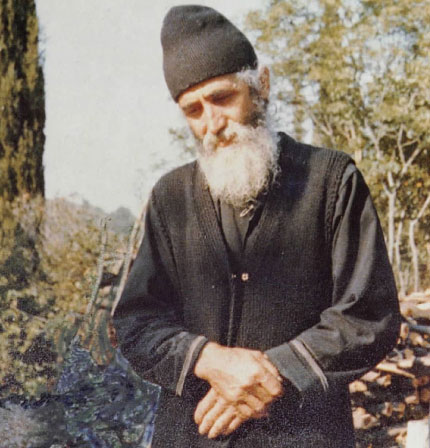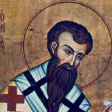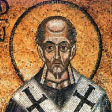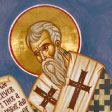Saint Paisios

The Life and Ministry of Saint Paisios of Mount Athos
Saint Paisios of Mount Athos, one of the most beloved contemporary saints of the Orthodox Church, stands as a shining example of humility, love, and ascetic devotion. His life, though rooted in the silence of monasticism, echoes across the world, drawing countless people to Christ through his words, prayers, and miracles. Saint Paisios lived in the modern age but embodied the timeless virtues of the desert fathers, serving as a bridge between the spiritual treasures of the past and the struggles of contemporary life.
Early Life and Formation
Saint Paisios was born Arsenios Eznepidis on July 25, 1924, in Farasa, Cappadocia (modern-day Turkey). His birth occurred during a period of great upheaval, as the Greek population faced persecution and displacement. Shortly after his birth, Arsenios' family fled to Greece during the population exchange between Greece and Turkey. His parents, devout and pious, raised their children in the Orthodox faith, imparting to young Arsenios a deep love for Christ and the saints.
From his early childhood, Arsenios exhibited signs of extraordinary spiritual sensitivity. He immersed himself in prayer and fasting, often retreating into solitude to converse with God. Inspired by the stories of saints and martyrs, he nurtured a desire to dedicate his life entirely to Christ.
After completing his education, Arsenios trained as a carpenter, following the trade of his father. During World War II, he served in the Greek army as a radio operator. Even during the hardships of war, his heart remained fixed on the monastic life, and he often risked his life to pray and keep his ascetic discipline.
Entrance into Monastic Life
In 1949, after his military service, Arsenios entered monastic life at the Monastery of Esphigmenou on Mount Athos, receiving the monastic name Averkios. His longing for a stricter ascetic practice led him to the Monastery of Philotheou, where he was tonsured a monk and given the name Paisios, in honor of Saint Paisios the Great.
At Philotheou, Paisios embraced the harsh rigors of Athonite monasticism, dedicating himself to ceaseless prayer, fasting, and obedience. He spent long hours in vigils, meditating on the Jesus Prayer and immersing himself in the writings of the Church Fathers. This period of intense spiritual struggle prepared him for the pastoral ministry that would later define his life.
Ministry of Spiritual Guidance
In the 1960s, after spending time in various monastic communities, including the Monastery of Stomion in Konitsa, Saint Paisios returned to Mount Athos. He settled in the skete of Iviron and later at Panagouda, a humble cell that became a sanctuary for thousands of pilgrims seeking spiritual counsel.
Saint Paisios possessed the rare gift of discernment, and his reputation as a spiritual guide spread rapidly. Pilgrims from Greece and abroad flocked to him, drawn by his humility, compassion, and miraculous insights into their souls. Despite the large numbers of visitors, Paisios greeted each person with love, offering prayers, advice, and comfort. His words carried the weight of divine grace, often healing physical illnesses and emotional wounds.
One of the hallmarks of Saint Paisios’ ministry was his profound empathy for human suffering. He taught that spiritual life must be rooted in love, humility, and trust in God. “God rests in humble souls,” he often said, emphasizing that pride and judgment distance the soul from divine grace. His counsel was simple yet deeply transformative, urging people to cultivate patience and repentance.
Miracles and Gifts of the Spirit
Saint Paisios' life was adorned with countless miracles, a testament to his holiness and closeness to God. He healed the sick, cast out demons, and often predicted future events with astonishing accuracy. Many who sought his prayers experienced profound healing, not only of the body but of the soul.
A striking aspect of his ministry was his ability to perceive the inner thoughts and struggles of those who approached him. Without prior knowledge, he could reveal hidden sins or offer solutions to personal problems, leading people to repentance and renewed faith. Despite these gifts, Saint Paisios remained deeply humble, attributing all miracles to the mercy of Christ and the intercession of the Theotokos.
Teachings and Spiritual Legacy
Saint Paisios left behind a treasury of spiritual teachings, preserved through the testimonies of his disciples and the books compiled from his conversations. His teachings emphasize the importance of ascetic struggle, the power of prayer, and the necessity of cultivating a heart full of love and forgiveness.
He often spoke about the need for discernment, warning against the extremes of zealotry and laxity. Saint Paisios encouraged Christians to maintain balance, trusting in God’s providence while actively engaging in spiritual warfare against the passions.
“Don’t fight evil directly,” he advised. “Strive to fill your heart with goodness, and evil will disappear on its own.” This reflects his deep understanding that spiritual transformation is achieved not by external force but by interior renewal through the grace of the Holy Spirit.
A recurring theme in his teachings was the power of the Jesus Prayer: “Lord Jesus Christ, Son of God, have mercy on me, a sinner.” Saint Paisios saw this prayer as a path to unceasing communion with God, capable of transforming the heart and sanctifying daily life.
Falling Asleep in the Lord and Canonization
In his later years, Saint Paisios suffered from health problems, including cancer. Despite his physical pain, he continued to receive pilgrims and offer spiritual counsel until the very end. On July 12, 1994, Saint Paisios fell asleep in the Lord at the Monastery of Saint John the Theologian in Souroti, near Thessaloniki.
His funeral was attended by thousands who revered him as a living saint. Miracles continued to occur at his grave, further affirming his sanctity. In 2015, the Ecumenical Patriarchate officially canonized him as Saint Paisios of Mount Athos, recognizing his holiness and profound impact on the Church. His feast day is celebrated on July 12.
Legacy and Relevance Today
Saint Paisios’ life serves as a beacon of hope in the modern world, demonstrating that holiness is attainable even in the midst of contemporary struggles. His witness reminds the faithful that Christ remains near to those who seek Him with sincerity and humility.
In a world often marked by division, anxiety, and materialism, Saint Paisios’ example calls us to simplicity, love, and trust in God’s providence. His life is a reminder that the path to sanctity lies in surrendering to God’s will, embracing suffering with patience, and cultivating a heart filled with compassion for others.
Through his prayers and intercessions, Saint Paisios continues to guide and inspire countless souls, leading them toward the Kingdom of Heaven – a living testament that God’s saints are never far from us, but walk alongside us, lifting us up in love and grace.







